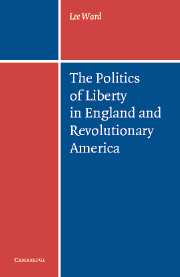Book contents
- Frontmatter
- Contents
- Acknowledgments
- Introduction: Reexamining the Roots of Anglo-American Political Thought
- PART ONE THE DIVINE RIGHT CHALLENGE TO NATURAL LIBERTY
- PART TWO THE WHIG POLITICS OF LIBERTY IN ENGLAND
- PART THREE THE WHIG LEGACY IN AMERICA
- 12 British Constitutionalism and the Challenge of Empire
- 13 Thomas Jefferson and the Radical Theory of Empire
- 14 Tom Paine and Popular Sovereignty
- 15 Revolutionary Constitutionalism: Laboratories of Radical Whiggism
- Conclusion
- Bibliography
- Index
12 - British Constitutionalism and the Challenge of Empire
Published online by Cambridge University Press: 28 October 2009
- Frontmatter
- Contents
- Acknowledgments
- Introduction: Reexamining the Roots of Anglo-American Political Thought
- PART ONE THE DIVINE RIGHT CHALLENGE TO NATURAL LIBERTY
- PART TWO THE WHIG POLITICS OF LIBERTY IN ENGLAND
- PART THREE THE WHIG LEGACY IN AMERICA
- 12 British Constitutionalism and the Challenge of Empire
- 13 Thomas Jefferson and the Radical Theory of Empire
- 14 Tom Paine and Popular Sovereignty
- 15 Revolutionary Constitutionalism: Laboratories of Radical Whiggism
- Conclusion
- Bibliography
- Index
Summary
The glorification of the British Constitution during the middle of the eighteenth century seen in Hume, Montesquieu, and Blackstone was not exclusively a British or even a European phenomenon. Deep admiration for the constitutional order produced by the Glorious Revolution was manifest in clear evidence on both sides of the Atlantic. Americans typically celebrated what they took to be the great virtues of British constitutionalism, such as the separation of powers, representative government, and the defense of civil liberties or “rights of Englishmen” with as much enthusiasm as their British brethren in the “transatlantic community” formed by the bonds of common sentiments, regular commercial contact, and, perhaps most importantly, a shared intellectual and political tradition. From Hume, Montesquieu, Blackstone, and the host of Whig writers including Trenchard and Gordon, Locke, and Sidney, Americans took enormous pride in what they perceived to be their constitutional heritage. The success of the revolution settlement touched the colonies in a particularly palpable way when the British government, primarily under Pitt's energetic leadership, fought and won a global war with its old foe, France, from 1756 to 1763 that ensured British supremacy over most of North America. With the defeat of Bourbon France in the New World and the colonies thriving with their own experience of self-government, political stability, and commercial prosperity under the benign neglect of the mother country, Americans in the middle of the eighteenth century by and large enjoyed as much contentment and political self-assurance as their complacent Whig brethren in the Old World.
- Type
- Chapter
- Information
- The Politics of Liberty in England and Revolutionary America , pp. 327 - 350Publisher: Cambridge University PressPrint publication year: 2004



